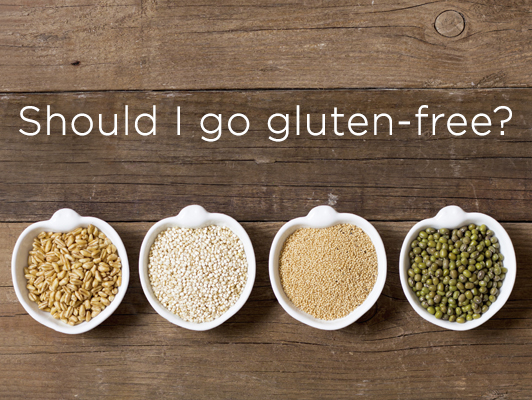Should I Go Gluten Free?

Great question! And with all the media attention gluten is getting these days, it’s normal to wonder that very thing! Let’s start with some general information.
What is gluten?
Gluten is the protein found in wheat, barley, and rye. Gluten gives elasticity to dough, and helps hold everything together. The final products often have a characteristic chewy texture.
Who should avoid gluten?
Some people have trouble digesting gluten. These people have a condition called celiac disease. Celiac disease is an autoimmune disorder in which the body mounts an attack on the small intestine when the person eats gluten. Over time, this response damages the lining of the small intestine, and nutrients cannot be absorbed properly. It is estimated that approximately 1 in 100 people worldwide have celiac disease. Celiac disease must be diagnosed by a doctor, and the only treatment is to avoid all gluten. Even small amounts of gluten, like a crumb left on a knife used to slice bread, can trigger an attack. Learn more about celiac disease here.
Another condition, called non-celiac gluten sensitivity (NCGS), is more poorly understood, and was not recognized as a condition until more recently. People with NCGS may experience many of the same symptoms of those with celiac disease, but without the damage to the intestinal tract or malnutrition. It’s unclear if the condition is actually caused by gluten or another component of wheat, like the sugar. A gastroenterologist can help with diagnosis.
Wheat allergy is a little different. It is an immune response to one or more components of wheat; not necessarily gluten (researchers have identified more than two dozen possible wheat allergens – gluten is just one). Whereas celiac and NCGS reactions typically involve the lower gastrointestinal tract, an allergic response typically involves the skin, respiratory, or upper GI tract. Some symptoms include rash, irritation of the mouth and throat, difficulty breathing, or nasal congestion. Many children will outgrow an allergy by adolescence.
Wouldn’t it be healthier if I just went gluten free?
Not necessarily. The above conditions require Medical Nutrition Therapy, in the form of a gluten-free or wheat-free diet to be able to function and thrive. If you do not have one of these conditions, there is no demonstrable benefit of going gluten-free. In fact, if not done under the supervision of a nutrition professional, a gluten-free diet can lead to nutritional deficit and eventual malnutrition.
Whole grains are still an important foundation of a healthy diet. Whole grains provide important healthy carbohydrates for energy and are also significant sources of vitamins, minerals, antioxidants, and phytonutrients. Fiber is vital for good health, and easily obtained from plant foods, including whole grains. The majority of Americans fall woefully short of the 25-38 gram/day recommendation. Other benefits of whole grains include:
- Helping with weight management
- Reducing constipation
- Reducing your risk of heart disease, type 2 diabetes, obesity, and cancer (particularly stomach and colon cancer)
- Managing diabetes
- Lowering blood pressure
All that being said, there is no “rule” that all the grains you eat have to be wheat. In fact, there may be some benefit to including more variety in your grain intake! Just make sure the majority of grain products you eat are whole grains. Other whole grains include:
- Brown rice
- Wild rice
- Millet
- Popcorn
- Amaranth
- Buckwheat
- Oats
- Quinoa
- Sorghum
- Teff
The gluten free diet fad
Gluten-free diets have become somewhat of a fad in recent years, and we’ve seen a subsequent explosion in the availability of supposed gluten-free food products. Some of these never contained gluten in the first place; olive oil, for example. Other products use non-gluten substitutes to try to replicate the original product; crackers and bread, for example. Many of the gluten-free substitutes used by industry are highly processed and refined, stripping most natural nutrition from them, and require a multitude of extra ingredients (also highly processed) to replicate the effect of gluten. That doesn’t make these products inherently “bad,” but it does mean they are probably foods to eat less often. Gluten-free products are sometimes little more than highly processed gluten-free junk food, masquerading as healthy. Make sure to read ingredient labels and compare products if you aren’t sure!
A final note
While it’s not essential, or even necessarily healthy, for the average person to go gluten-free, there’s no harm in increasing your variety of whole-grain intake. By incorporating more whole grains into your day, you’ll not only increase your nutrient intake and feel fuller and more satisfied, you may even find it’s easier (and tastier) than you thought to achieve your health and wellness goals!


